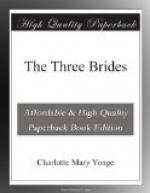Cecil’s kiss was more hearty than any she had given at Compton, and she descended; but just as she came to the door, and was only delaying while Frank and Captain Duncombe were discussing the merits of the four horses, the Compton carriage appeared in the approach, and Raymond’s head within. Lady Tyrrell looked at Cecil, and saw it was safe to make a little gesture with the white skin of her fair brow, expressing unutterable things.
Mrs. Duncombe lost no time in asking if any steps were being taken for improving the drainage; to which Raymond replied, “No, that was not the business in hand. This was the architecture of the town-hall.”
“Splendour of municipality above, and fever festering below,” said Mrs. Duncombe.
“Wilsborough is not unhealthy,” said Raymond.
She laughed ironically.
“The corporation have been told that they have an opportunity,” said Raymond; “but it takes long to prepare people’s minds to believe in the expedience of such measures. If Whitlock could be elected mayor there would be some chance, but I am afraid they are sure to take Truelove; and as things are at Wilsborough, we must move all at once or not at all. Individual attempts would do more harm than good.”
“Ah! you fear for your seat!” said the plain-spoken lady.
Raymond only chose to answer by a laugh, and would not pursue the subject so treated. He was politeness itself to all; but he withstood Lady Tyrrell’s earnest entreaties to come in and see some Florentine photographs, growing stiffer and graver each moment, while his wife waxed more wrathful at the treatment which she knew was wounding her friend, and began almost to glory in having incurred his displeasure herself. Indeed, this feeling caused the exchange of another kiss between the ladies before Sir Harry handed Cecil into the carriage, and Raymond took the yellow paper books that were held out to her.
Looking at the title as they drove off, he said quietly, “I did not mean to deprive you, Cecil; I had ordered Lanfrey from Bennet for you.”
She was somewhat abashed, but was excited enough to answer, “Thank you. I am going to join Lady Tyrrell and Mrs. Duncombe in a subscription to Rolandi’s.”
He started, and after a pause of a few moments said gently, “Are you sure that Mr. and Mrs. Charnock would like to trust your choice of foreign books to Mrs. Duncombe?”
Taking no notice of the point of this question, she replied, “If it is an object to exchange books at home faster than I can read them properly, I must look for a supply elsewhere.”
“You had better subscribe alone,” he replied, still without manifest provocation.
“That would be uncivil now.”
“I take that upon myself.”
Wherewith there came a silence; while Cecil swelled as she thought of the prejudice against her friend, and Raymond revolved all he had ever heard about creatures he knew so little as women, to enable him to guess how to deal with this one. How reprove so as not to make it worse? Ought not his silent displeasure to suffice? And in such musings the carriage reached home.




